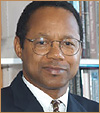
Eugene Washington
Executive Vice Chancellor Eugene Washington recently shared his goals for the future, stressing the importance of empowering people to achieve their utmost potential.
Washington says his management philosophy is to provide faculty and staff moral and financial support, in part, by allocating resources for professional development and training and articulating a clear vision for the future.
"I firmly believe it's the people who make UCSF great," he said. "Having the right people in our community to fulfill all our missions, fully developing their talents, freeing them to express themselves, supporting them in achieving their own individual goals and motivating them to work together in pursuit of our shared vision is the key to remaining an exceptional institution."
In fact, Washington is addressing faculty development and advancement through the expansion of opportunities for leadership development, mentoring and orientation. These efforts will be assisted by the appointment of a new associate vice chancellor for academic affairs, who will be announced following approval by the UC Board of Regents.
Washington's address to the UCSF Academic Business Officers Group (ABOG) on Jan. 27 is one in a series with campus leaders organized by ABOG in response to two employee opinion surveys in which respondents asked for more contact and communication with UCSF officials. Washington drew about 70 people midday to the Lange Reading Room.
Washington said he welcomes the opportunity to engage in a dialogue with faculty, staff and students from across the University. "I perform my duties best when I understand the desires and wishes and the common thread among those throughout our institution," he said.
Vision and Action
Appointed to the No. 2 post by Chancellor Mike Bishop, Washington began serving as executive vice chancellor in February 2004. In this multi-faceted role, he oversees the research enterprise and academic affairs - consolidated from two positions -- works with vice chancellors on campuswide issues and represents the campus and chancellor internally and externally.
To be an effective leader in a University of this caliber, Washington says it's extremely important to have a vision and to articulate it in a well-defined and understood prioritized plan of action. Quoting a Japanese proverb, Washington said, "Vision without action is daydreaming. Action without vision is a nightmare."
"You really do have to combine these - vision and action. If you can accurately define the questions it helps to focus attention on important issues and bring to a peak the essential elements that you want to pursue."
A 1976 graduate of the UCSF School of Medicine, Washington is an internationally renowned clinical investigator and health policy analyst who has served UCSF, the UC system, and various local, state, federal and international agencies in several roles for decades. He also directs the UCSF Medical Effectiveness Research Center for Diverse Populations (MERC), which focuses on research aimed at measuring outcomes and improving the health of minority and underserved populations.
As executive director at UCSF, Washington also is focusing on making improvements and measuring progress.
After taking the helm at the Office of Research, Washington spent time with staff talking about the vision and mission, which evolved into a three-point plan to promote research and improve health by: providing high-quality services to the campus community, fostering new research initiatives and translating discoveries for the public benefit.
To accomplish some of these tasks, Washington launched the Quality Improvement Project, which will examine research administration processes and establish best practices in all areas - from animal research to conflict of interest. With the help of many faculty, staff and a few consultants, Washington's team is looking for ideas at other comparable universities that will spawn improvements in systems and services, including more widespread use of online processes providing real time information.
Likewise, Washington intends to bring UCSF systems into the 21st century by establishing electronic records for data, such as contracts and grants, issuing quarterly reports on how the office is processing these and surveying customers. The big theme, he says, is setting standards, monitoring, measuring and reporting progress - all of which he has had experience with at MERC. Under Washington's direction, UCSF is already testing new systems in two pilot projects for the Immune Tolerance Network and Department of Medicine. Washington hopes to roll out new practices and procedures across the Office of Research by the end of the next academic year. "Our goal really is to be the best," he said.
In addition, Washington is forming working groups over the next six months to determine how best UCSF can establish industry partners to translate discoveries into public benefit. He also is examining through a faculty working group how UCSF can appropriately reward collaborative research conducted in a multidisciplinary, cross-campus manner, which mirrors a national trend.
As for his personal aspirations, Washington said he wants to help improve the quality of life for faculty, staff and students, advance clinical and translational research, improve administrative systems and services broadly, promote diversity, and assist campus planning, in part by crafting a campuswide strategic plan.
"Of course, we have to always remain flexible and opportunistic, but we need to have a clear sense of where we're going. So stay tuned."
Source: Lisa Cisneros
Related Links
Washington Named Executive Vice Chancellor

